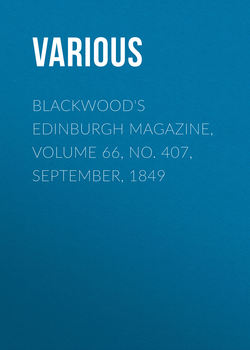Читать книгу Blackwood's Edinburgh Magazine, Volume 66, No. 407, September, 1849 - Various - Страница 8
AUTOBIOGRAPHY – CHATEAUBRIAND'S MEMOIRS.3
ОглавлениеAutobiography, when skilfully and judiciously done, is one of the most delightful species of composition of which literature can boast. There is a strong desire in every intelligent and well-informed mind to be made acquainted with the private thoughts, and secret motives of action, of those who have filled the world with their renown. We long to learn their early history, to be made acquainted with their first aspirations – to learn how they became so great as they afterwards turned out. Perhaps literature has sustained no greater loss than that of the memoirs which Hannibal wrote of his life and campaigns. From the few fragments of his sayings which Roman admiration or terror has preserved, his reach of thought and statesmanlike sagacity would appear to have been equal to his military talents. Cæsar's Commentaries have always been admired; but there is some doubts whether they really were written by the dictator; and, supposing they were, they relate almost entirely to military movements and public events, without giving much insight into private character. It is that which we desire in autobiography: we hope to find in it a window by which we may look into a great man's mind. Plutarch's Lives owe their vast and enduring popularity to the insight into private character which the innumerable anecdotes he has collected, of the heroes and statesmen of antiquity, afford.
Gibbon's autobiography is the most perfect account of an eminent man's life, from his own hand, which exists in any language. Independent of the interest which naturally belongs to it as the record of the studies, and the picture of the growth of the mind of the greatest historian of modern times, it possesses a peculiar charm from the simplicity with which it is written, and the judgment it displays, conspicuous alike in what is revealed and what is withheld in the narrative. It steers the middle channel so difficult to find, so invaluable when found, between ridiculous vanity on the one side, and affected modesty on the other. We see, from many passages in it, that the author was fully aware of the vast contribution he had made to literature, and the firm basis on which he had built his colossal fame. But he had good sense enough to see, that those great qualities were never so likely to impress the reader as when only cautiously alluded to by the author. He knew that vanity and ostentation never fall to make the character in which they predominate ridiculous – if excessive, contemptible; and that, although the world would thankfully receive all the details, how minute soever, connected with his immortal work, they would not take off his hands any symptom of his own entertaining the opinion of it which all others have formed. It is the consummate judgment with which Gibbon has given enough of the details connected with the preparation of his works to be interesting, and not enough to be ridiculous, which constitutes the great charm, and has occasioned the marked success, of his autobiography. There are few passages in the English language so popular as the well-known ones in which he has recounted the first conception, and final completion of his history, which, as models of the kind, as well as passages of exquisite beauty, we cannot refuse ourselves the pleasure of transcribing, the more especially as they will set off, by way of contrast, the faults in some parallel passages attempted by Chateaubriand and Lamartine.
"At the distance of twenty-five years, I can neither forget nor express the strong emotions which agitated my mind as I first approached and entered the Eternal City. After a sleepless night, I trod with a lofty step the ruins of the Forum. Each memorable spot – where Romulus stood, or Tully spoke, or Cæsar fell – was at once present to my eyes; and several days of intoxication were lost, or enjoyed, before I could descend to a cool and minute investigation. It was at Rome, on the 15th October 1764, as I sat musing amidst the ruins of the Capitol, while the barefooted friars were singing vespers in the Temple of Jupiter, that the idea of writing this Decline and Fall of the city first started to my mind. But my original plan was circumscribed to the decay of the city, rather than of the empire; and though my reading and reflections began to point towards that object, some years elapsed, and several avocations intervened, before I was seriously engaged in the execution of that laborious work." – (Life
